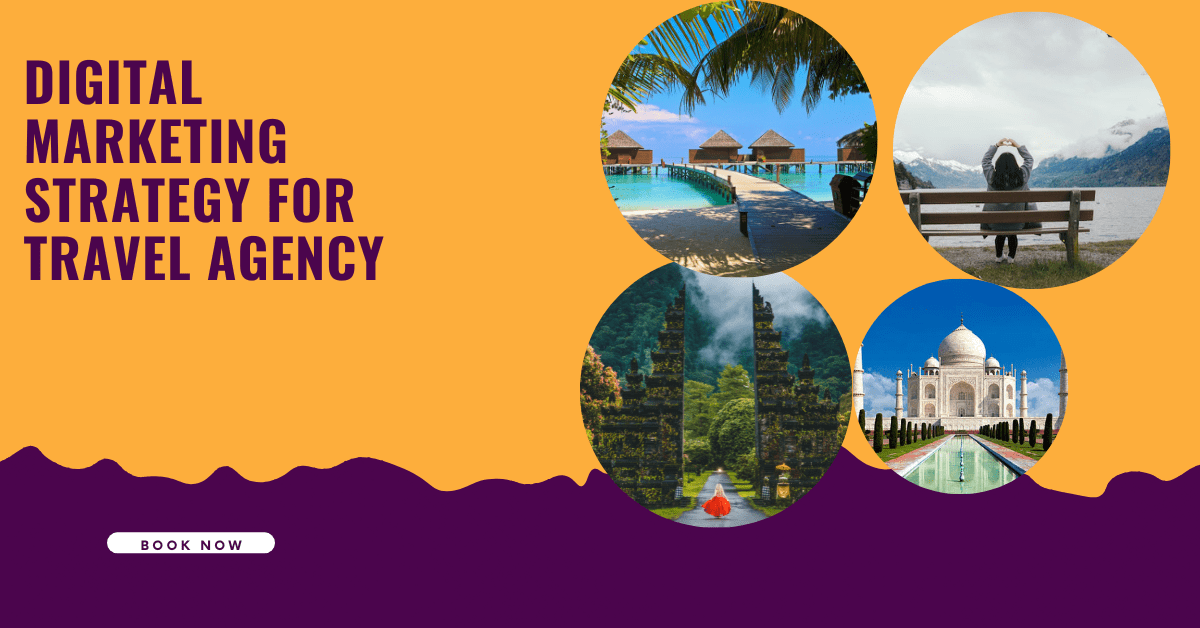A successful online marketing strategy travel agency requires consistency, adaptability, and a continuous effort to stay updated with industry trends and changes in consumer behavior. Top 10 best digital marketing strategy for travel agency are given below:
1. Set your objectives as an online travel agency:
Determine exactly what you want to achieve with your efforts in digital marketing to get started. Examples can include promoting awareness of the brand, generating leads, bookings, or website traffic.
2. Define your target audience :
Determine who your ideal customers are and create detailed buyer personas. Take into account your audience’s demographics, hobbies, internet habits, and pain areas. This will enable you to better target your marketing efforts and select the most effective online marketing platforms.
3. Website optimization:
Make sure that your travel agency’s website is user-friendly, attractive, and search engine optimized. Use on-page SEO strategies like as meta tags, keyword optimization, and pertinent content. Make it simple for visitors to explore and obtain information through the use of clear calls-to-action (CTAs) as a best travel agency.
4. Content marketing :
Create a content plan that engages your audience and highlights your skills in content marketing. Tour agencies produce informative blog posts, articles, travel guides, and destination guides. To increase engagement, think about adding visual content like pictures and videos. Share your content via email newsletters, your website, and social media sites.
5. Social media marketing:
How to promote a travel agency on social media? Utilize social media sites like Facebook, Instagram, Twitter, and LinkedIn for social media marketing to interact with your target market. Share attractive and visually appealing stuff, such as travel-related stories, videos and images. To reach a larger audience, engage with your followers, reply to comments, and use social media advertising.
6. Search engine marketing (SEM):
Utilize search engine marketing (SEM) techniques for your travel industry to better position yourself on search engine result pages (SERPs). Utilize platforms like Google Ads or Bing Ads to implement pay-per-click (PPC) advertising campaigns. Research keywords to find relevant search terms and make the ads as visible as possible.
7. Email marketing:
Create an email list of future customers and current clients to use for email marketing. Send regular mailings with personalized travel advice, exclusive offers, and useful information. Send subscribers relevant material by segmenting your email list based on their interests and past travel experiences.
8. Influencer collaborations:
travel companies can Work with bloggers or influencers in the travel industry who have a significant following among your target audience. Through sponsored content, guest blog posts, social media takeovers, and influencer-led tours, collaborate with them to promote your travel company and its destinations. Their suggestions may have a significant impact on the credibility and reach of your brand.
9. Online reviews and reputation management:
Encourage pleased clients to post favorable comments on sites like Yelp, Google My Business, and TripAdvisor. Following up on reviews in a timely manner to address any issues or concerns identified. A positive online reputation promotes trust and draws in new clients.
10. Tracking and analyzing performance:
Use analytics tools on a regular basis to measure the success of your online marketing campaigns. Keep eyes on statistics such as website traffic, conversion rates, email open rates, social media engagement, and advertising campaign ROI. Utilize this information to pinpoint areas that need improvement and adjust your strategy as necessary.
FAQ:
The period of time it takes to see results from a digital marketing plan can vary based on a number of variables, such as how competitive your business is, how well your methods work, and how consistently you put forth effort. Generally speaking, it’s critical to realize that digital marketing is a long-term investment that necessitates patience and persistence. While strategies like paid advertising can sometimes produce some quick results, organic development and creating a strong internet presence often take time, frequently several months to a year or more.
The digital marketing channels you use will rely on your target market, objectives, and budgetary limitations. However, a few important paths that can be productive for travel companies are as follows:
1.Search engine optimization (SEO): Improving your website’s performance to rank better and bring in organic traffic.
2.Pay-per-click (PPC) advertising involves displaying tailored ads on websites like Google Ads or Bing Ads to attract visitors and sales.
3.Utilizing social media channels like Facebook, Instagram, Twitter, and LinkedIn to interact with your audience, publish travel-related material, and advertise your products.
4.To nurture leads and advertise travel deals, use email marketing to create a subscriber list and deliver tailored newsletters.
5.Content marketing is the process of producing excellent blog posts, articles, and travel guides to engage your audience and show your expertise.
It’s essential to measure the success of your digital marketing campaigns in order to determine what works and how to improve your approach. Here are some crucial parameters to monitor:
1.Website analytics: Track website traffic, user activity, conversion rates, and other pertinent metrics using programs like Google Analytics.
2.Set up conversion monitoring to monitor particular behaviors that signify success, including reservations, queries, or newsletter sign-ups.
3.Track interaction data on social media networks, such as followers, likes, comments, shares, and reach.
4.Metrics for email marketing Keep track of your email campaigns’ open, click-through, and conversion rates.
5.ROI: Return on investment By comparing the expenses incurred with the income produced, determine the return on investment for your digital marketing activities.

